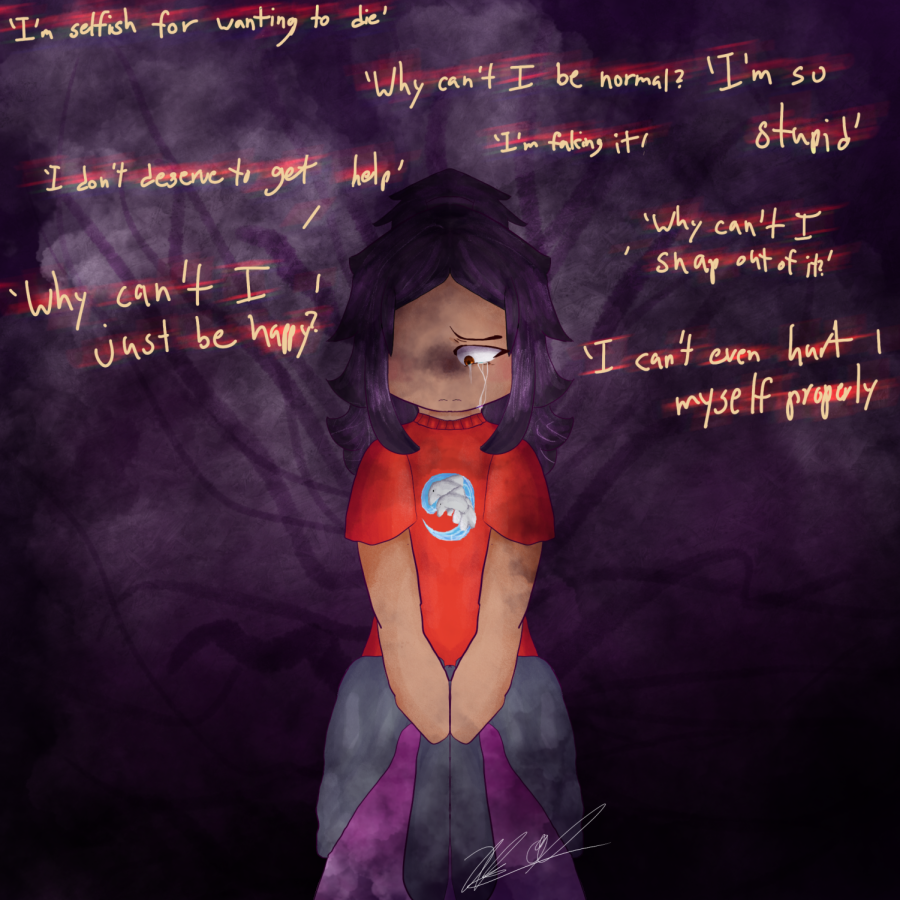It Still Hurts
By Cheska Orias
Mental health stigma is defined as someone who views you in a negative way because of a prominent characteristic or personal trait that a person has that is seen/ or is a disadvantage. *This illustration placed 1st in Illustration in the 2023 Hawaii High School Journalism Awards.
November 3, 2022
*This article placed 4th in Opinion Writing in the 2023 Hawaii High School Journalism Awards.
Editor’s Note: This article includes topics of self-harm and suicide.
“It’s just a phase, you’ll get over it,” Mom told me. Wiping away my tears, I nodded.
That was five years ago, and yet that wound still drips blood. That response I got after admitting to wanting to commit suicide. I believed what my mom told me that it was just a whole big phase that I will get over. I walked back to my room, eyes filled with tears. As the days passed my parents acted as if nothing happened.
I knew they cared for me and wanted to help, but they didn’t know how.
Chatting away online on a discord server, I mentioned in the vent channel how I had started starting to self-harm using needles.
“Those aren’t real self-harm wounds. Stop faking”.
But these actions weren’t something I could control, yet nobody took me seriously.
Three years ago, I was caught in the act of self-harm with my arms littered with small cuts from a needle I used. My mom could only yell out in frustration and anger, asking why I was so selfish.
“Stop doing that! Stop being so selfish! Do you know how much you are hurting me and your father?!”
I didn’t think what I was doing was selfish, but her words made me feel like I needed to hide my feelings.
That old wound grew bigger that day.
One year ago, I sat outside my parents’ apartment, locked out after a failed suicide attempt. The neighbor downstairs called the cops on me thinking I was a homeless person. When I was taken back inside, my parents found out the truth. They started to sob and cry, asking me just why. Why would I do this to them? Why would I be that selfish?
That word again. Selfish. I’m not selfish knowing this now. If I could only find the courage in myself that day to explain how I felt and how I wasn’t selfish. These words would continue to seep into my brain, keeping me quiet. I don’t remember when I finally got better and started to heal, but all those things my parents said to me still stick with me and affect the things I do today.
Mental health stigma is defined as someone who views you in a negative way because of a prominent characteristic or personal trait that a person has that is seen/ or is a disadvantage. It can be subtle or right in your face, yet either way, it can still cause harm to a person. Stigma can dehumanize a person and makes it less likely they’ll seek help. It can also create fewer opportunities in school, the workplace, and social activities. This in turn only makes it worse for the person.
Coming from personal experience it certainly made me feel like there was something wrong with me, as my parents would put it before I was ‘crazy’. My parents never really dealt with anything like this so the first thing that came to their mind was I was just acting crazy, and each time I had an outburst it just affirmed their belief. They just shooed me away into another room thinking I would calm down.
Those in turn only made my panic attacks worse as I grew up, and made the way I dealt with them worse. I’d bottled it up as much as I could, trying to seem ‘normal’ to others in a desperate attempt to stay in the crowd.
Today I still struggle with the things my parents and others said to me in the past.
Just writing about this topic makes me question and wonder, was I just overreacting in the past? Was I really selfish?
Just to put it simply, mental health stigma damages people deeply. It can happen anywhere and to anyone. Elderly, young adults, teens, and children. At home, at parties, at work, in public, and at school. You can see it anywhere at any time. You can see it happening to someone else or unknowingly to yourself. It can be in the form of discrimination, people stereotyping, or overall having a negative belief.
I know my parents were worried for me and cared deeply for me. They just didn’t know how to show it and lacked the information on what is going on with me and what they could do to help me.
Sadly, mental health stigma comes from a lack of understanding, misinformation, and because people have negative beliefs towards those with mental illness. The best we can do is inform and educate people on the topic so they can have a more open mind. Or if you are willing to do it, speak from experience and how it affected you.
Think of it as an invisible wound. I only started to notice my wound when I saw others like me on social media.
That wound may leave a scar once it heals, and that’s okay. I’ve been able to win my battle and it shows how far I’ve come.






